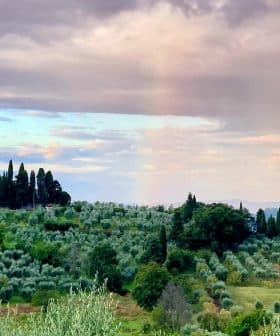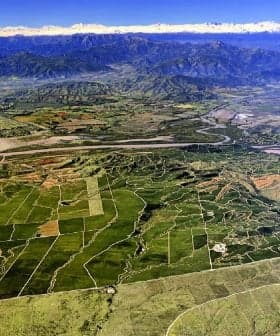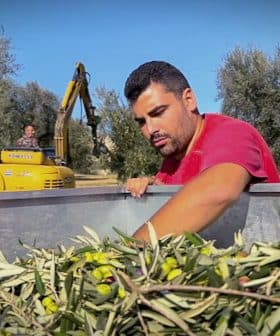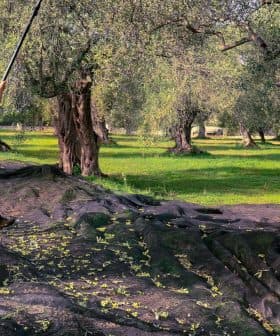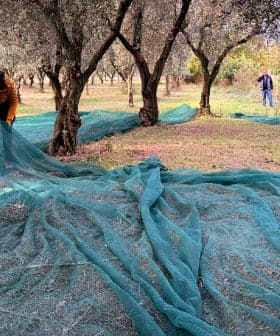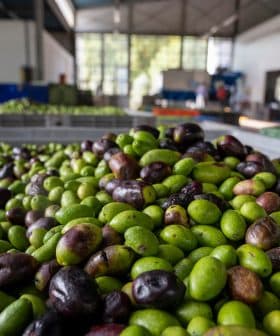Europe Passes Controversial Measure to Restore Nature
The new law, approved with a razor-thin margin, requires member states to introduce measures to restore twenty percent of land and sea by 2030.
 Aval and Needle of Etretat, Normandy, France
Aval and Needle of Etretat, Normandy, France The European Parliament narrowly approved a new law to restore and protect nature in member states, part of the E.U.‘s 2030 Biodiversity Strategy, despite opposition from right-wing political groups. The law requires member states to introduce measures to restore nature on at least 20% of their land and sea by 2030, with plans to expand to cover all ecosystems by 2050.
The European Parliament has marginally approved a contentious legislative proposal of the European Commission to restore and protect nature in its member states.
In what has been a fierce battle between right- and left-wing political groups in the European Parliament, the new legislation received 336 parliamentary votes in favor and 300 against, while 13 members of the parliament (MEPs) abstained from voting.
The ‘Nature Restoration Law’ is a core pillar of the E.U.’s 2030 Biodiversity Strategy, a set of recommendations targeted to restore Europe’s degraded ecosystems.
See Also:Farm to Fork Strategy Under Fire Ahead of European Elections in 2024According to the commission, more than 80 percent of the habitats in Europe are in poor condition. The commission also noted that every Euro invested in restoration would return between €8 and €38 in ecosystem services.
Under the new bill, characterized by the commission as “the first continent-wide, comprehensive law of its kind,” the E.U. member states must introduce measures to restore nature on at least 20 percent of their land and sea by 2030.
Furthermore, by 2050, the measures must be expanded to cover all ecosystems in need of restoration.
A day before the voting, hundreds of farmers demonstrated in front of the European Parliament, calling on the MEPs to reject the new law. On the other hand, climate activists, including Greta Thunberg, urged the MEPs to pass the law.
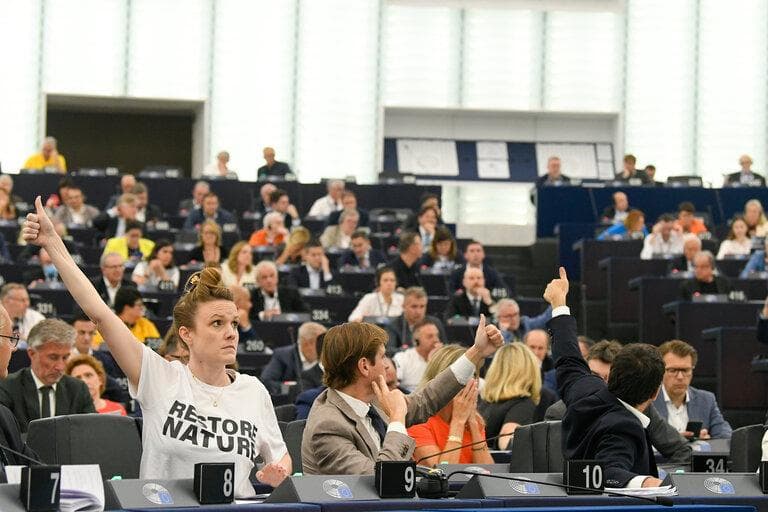
Voting for the Nature Restoration Law (European Parliament)
The Fisheries and Agriculture committees of the European Parliament had previously rejected the bill. At the same time, it failed to garner the necessary majority in the Environment committee to move forward.
As a result, and according to standard procedure, the legislation was punted to the parliament’s plenary vote with the recommendation to be scrapped. However, it managed to receive approval from the majority of European Parliament members.
“It’s a huge social victory,” César Luena, a center-left MEP from Spain in charge of the proposal, said. “This is a law on behalf of nature. It’s not a law against any person whatsoever.”
The new bill met strong opposition from the European Parliament’s right-wing political groups, such as the center-right European People’s Party (EPP), the biggest lawmaker group of the European Parliament, and the far-right Identity and Democracy Group.
“Less land for farmers, less sea for fishermen, less activity for businesses, and fewer European products and jobs for our citizens,” said Rosanna Conte, an Italian MEP from the Identity and Democracy group. “These are the heavy repercussions of the proposals contained in a regulation permeated with ideology and counterproductive for nature itself.”
However, the parliament’s right-wing front suffered cracks, with some EPP members breaking away from the group’s position to support the proposed regulation.
“I cannot, in good conscience, good faith, vote against this law,” said Frances Fitzgerald, an Irish MEP and the vice-chair of the EPP. “We should have a constructive approach.”
The European Parliament finally agreed to a watered-down version of the original law, with amendments to remove the restoration of European peatlands and delay the law’s application until an official assessment of European food security has been carried out.
Farming lobby Copa-Cogeca said the law remained “fundamentally ill-prepared, lacks a budget and will remain unimplementable for farmers and forest owners.”
International environmental organizations welcomed the new regulation as a significant step toward protecting Europe’s nature.
“This vote shows that there is still hope to restore and grow what’s left,” said Špela Bandelj, Greenpeace’s Central and Eastern Europe biodiversity project manager. “As another unprecedented heatwave grips Europe, it’s clear that to survive climate breakdown and ensure food supplies, we’ll need nature on our side.”
Next, The parliament will negotiate with the member states to thrash out the regulation’s provisions and finalize the text.
After the regulation comes into force, the E.U. countries will be expected to submit national restoration plans to the Commission within two years.
Share this article


